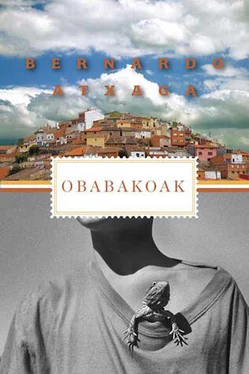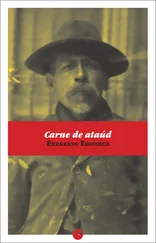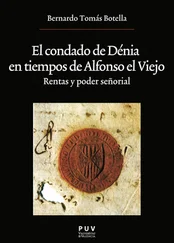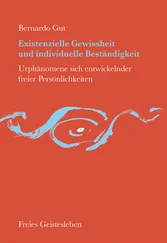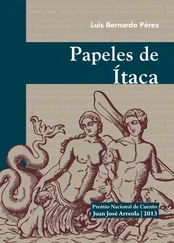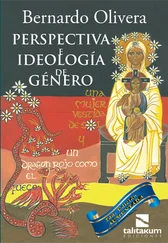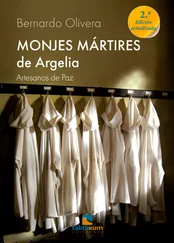Bernardo Atxaga - Obabakoak
Здесь есть возможность читать онлайн «Bernardo Atxaga - Obabakoak» весь текст электронной книги совершенно бесплатно (целиком полную версию без сокращений). В некоторых случаях можно слушать аудио, скачать через торрент в формате fb2 и присутствует краткое содержание. Год выпуска: 2010, Издательство: Graywolf Press, Жанр: Современная проза, на английском языке. Описание произведения, (предисловие) а так же отзывы посетителей доступны на портале библиотеки ЛибКат.
- Название:Obabakoak
- Автор:
- Издательство:Graywolf Press
- Жанр:
- Год:2010
- ISBN:нет данных
- Рейтинг книги:3 / 5. Голосов: 1
-
Избранное:Добавить в избранное
- Отзывы:
-
Ваша оценка:
- 60
- 1
- 2
- 3
- 4
- 5
Obabakoak: краткое содержание, описание и аннотация
Предлагаем к чтению аннотацию, описание, краткое содержание или предисловие (зависит от того, что написал сам автор книги «Obabakoak»). Если вы не нашли необходимую информацию о книге — напишите в комментариях, мы постараемся отыскать её.
Obabakoak
The Observer
Obabakoak — читать онлайн бесплатно полную книгу (весь текст) целиком
Ниже представлен текст книги, разбитый по страницам. Система сохранения места последней прочитанной страницы, позволяет с удобством читать онлайн бесплатно книгу «Obabakoak», без необходимости каждый раз заново искать на чём Вы остановились. Поставьте закладку, и сможете в любой момент перейти на страницу, на которой закончили чтение.
Интервал:
Закладка:
“Aren’t they pretty?” he said then, picking up a lizard and placing it in his hand. “So green,” he added. I was already at the door of the hut.
“Yes, they certainly are very pretty. But I have to go now, Albino María. Sorry I can’t stay.” And without another word, I raced off toward the fence.
“Come back any time you like!” shouted Albino María from the doorway.
The torch
I WANTED TO FIND a word to finish the book with. I mean I wanted to find one word, but it couldn’t be just any word, it had to be a word that was both definitive and all encompassing. I mean, to put it another way, that I wanted to be another Joubert, that he and I shared the same goal: “S’il est un homme tourmenté par la maudite ambition de mettre tout un livre dans une page, toute une page dans une phrase, cette phrase dans un mot, c’est moi.” Yes, that man was Joubert, and, as I have just said, I wanted to be another Joubert.
I felt tired and disillusioned, old before my time, and when I sat down in front of a blank sheet of paper, I would weep. I mean that I found the invention and putting together of sentences was becoming ever more difficult, a torment, the cause of great suffering, which is why, as I said before, I kept dreaming about Joubert.
But I couldn’t find that last word. I would look out of the window, I would watch the waves of the sea rising and breaking and I would ask the waves for an answer, but it was no use. Then I asked the stars in the sky and it was the same. I asked other people and that was even worse. I mean they were no help at all, they always ended up leaving me alone again in front of the blank page. And then I would think to myself: Why don’t you tell the story of the journey you made to Obaba? Maybe in recounting the events of that weekend you’ll find the wretched word. I mean that I screwed up my courage and set off in search of the word, since it clearly had no intention of coming to me. That’s what I mean, more or less.
But the task I had set for myself turned out to take longer than I thought. I mean recounting what happened on my journey was not the brief, pleasant pastime I had at first supposed, quite the contrary. The days passed and I made no progress. The last word was nowhere to be found. And I would say to myself: All right, it hasn’t turned up today, but maybe it will tomorrow. Don’t worry about it. Instead of worrying, why not write down that story about Baghdad? And so I did. I mean I devoted all my time to recording the things that had happened on that journey and, in the process, months and even years went by. And what I really wanted kept being left to one side, kept being left farther and farther behind. Some nights Joubert would appear to me in my bedroom and call me to account. Why do you turn away from your true work like a sick dog from a bone? I do not spurn it, master, but there is another story I have to write down first, the one an old man told me at a village fiesta; Laura Sligo, that was the name, the character’s name I mean, not the old man’s. No, no, no! Joubert would say to me, don’t deceive yourself, the problem is that you can’t do it, the problem is that you’re just like a lot of other writers of today, you’re just the same as them, you’re identical or similar or comparable. And with that, Joubert would go, leaving me sad. I mean no one enjoys hearing the truth.
For the fact is that I did keep putting off my real work until the next day, again and again, and that was my downfall. Because now it’s too late, because now I never will find the final, definitive, all-encompassing word. And that’s why I could be likened to those pilgrims who went off in the hope of seeing the sea but died without even setting foot on the beach. For I too am dead, at least according to my uncle. Dead without ever having found the last word. That’s why I mentioned the story about the pilgrimage and the beach. I’m not sure if I made myself clear.
But perhaps I’m going too fast, which is utterly ridiculous. I mean it makes me laugh to think that the reason I have to go fast now is that I went too slowly before. I have very little time, in other words, and I’m going much too fast. Or at least that’s what they tell me, my friend and my uncle that is. I don’t really know why they say that, but they’re probably right. We mustn’t forget that my friend is a doctor, which is important. But, anyway, as I was saying, I go much too fast and get confused. But now I’ll explain properly. I’ll explain the reasons for my impotence, the reason why I never will find the last word and all that.
Well, what happened was that, some months after my visit to Obaba, the people at home said to me: You’re going deaf, you know. Me, deaf? I don’t think so, I said, going on with my work. Because at that time, as I said before, I was engaged in writing down all the things that had happened on the journey to Obaba. But they didn’t agree: You are going deaf. If anyone talks to you on your right side, you don’t hear a thing. You should go to the doctor. And so I went. You’ve got a pierced eardrum said my friend, the doctor. I mean that the doctor is my friend and it was he who told me that.
My friend — the doctor, right? — looked at me hard and said: Has your head felt strange at all? Any headaches? Do you sleep well? Of course I do. Why do you ask? I asked. And my friend looked away, embarrassed.
I did feel a little worried that day, but not much. I went on with my work. I mean I was translating a story entitled “Wie Lie Deshang” and had no time to think about anything else. And anyway, to tell the truth, I didn’t really understand my friend’s question. After all what did it matter if I was a little deaf?
My worries, my real worries, began later, a month later. I mean my friends began to hate me, not much, but a little. What happened was that we were all eating and drinking in a restaurant when they suddenly burst out laughing. What are you laughing at? I asked. And they replied: What’s wrong, “Mr. I — mean?” Didn’t you enjoy the joke? What joke? I said, getting angry. And anyway why have you started calling me “Mr. I — mean?” Don’t you know my real name? That was no way to talk to one’s friends, of course, and it was then that they began to hate me, not much, but a little, as I said before.
Then, since my friends didn’t want me around anymore, I decided to leave for Obaba and go to my uncle’s house. And I spent hours and hours there reading and reading. One day my uncle asked: Why are you reading so many children’s books? Are you thinking of writing an essay on children’s literature? No, not at all, I replied, I’m reading them because I like them. Children’s books are really fantastic, Uncle. Are they? he asked, looking puzzled. Yes, they are, I said. For example, this one I’m reading at the moment is all about a mouse. It seems that this mouse, whose name is Timmy Willie, lives in a vegetable garden in a little village and what do you think happens? Well, one day he climbs into a basket to eat some peas and he goes to sleep there. I mean he just sort of drops off. And the owner of the vegetable garden comes along, lifts the basket onto his shoulder, and goes off to the city to sell the peas. And all this time Timmy Willie is inside oblivious to everything and then, I’m sorry, Uncle, but I have to laugh. And I burst out laughing. But I stopped at once when I saw the tears in my uncle’s eyes. I mean it’s not nice to laugh in front of someone when they’re feeling sad, not nice at all.
Even so, even though he was sad, my uncle looked after me well, very well, I’ve absolutely no complaints on that score. He brought me orange juice in bed every morning and even a newspaper. I didn’t fancy it, though. I mean I’d drink the orange juice at once, but I didn’t touch the newspaper. I preferred to continue the adventures of Timmy Willie. Put that book down now, Nephew, and read the articles in the paper, he’d beg me. And because I love my uncle very much, I made an effort to please him. But it was all in vain. It was a real struggle for me to understand what was in the newspaper, especially the sports pages, that was the hardest bit, much harder than the political reports.
Читать дальшеИнтервал:
Закладка:
Похожие книги на «Obabakoak»
Представляем Вашему вниманию похожие книги на «Obabakoak» списком для выбора. Мы отобрали схожую по названию и смыслу литературу в надежде предоставить читателям больше вариантов отыскать новые, интересные, ещё непрочитанные произведения.
Обсуждение, отзывы о книге «Obabakoak» и просто собственные мнения читателей. Оставьте ваши комментарии, напишите, что Вы думаете о произведении, его смысле или главных героях. Укажите что конкретно понравилось, а что нет, и почему Вы так считаете.
